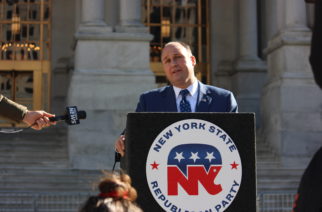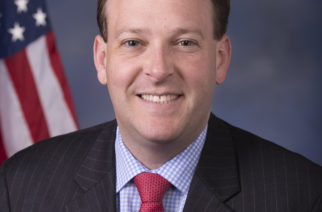
Assemblywoman Nicole Malliotakis is pictured at a press conference in the State Capitol. Malliotakis, a Republican, is taking on Democrat Max Rose, a first-term incumbent, for New York’s 11th Congressional District. The two candidates faced off in a debate last week and discussed climate change, police reform and COVID aid to local governments.
First-term incumbent and Democratic U.S Congressman Max Rose is running for re-election against Republican Assemblywoman Nicole Malliotakis for New York’s 11th Congressional District in one of the most closely watched elections of the year.
The outcome of this contentious swing district, which includes Staten Island and southern Brooklyn, could greatly be influenced by how voters will cast their ballots on the national level.
In a remote debate on Oct. 14, the two candidates addressed plans for criminal justice which included the defunding police movement, the coronavirus pandemic and subsequent relief, climate change and opinions on President Trump.
Both candidates have been recognized for their slew of harsh campaign advertisements aimed at each other and other elected officials in a race to win over the 95,250 active independent voters. There are 189,105 active voters affiliated with the Democratic Party and 113,255 active Republican voters in the district which makes for a tight congressional election.
To add to the uncertainty of this race, Staten Island is considered an anomaly, as it was the only borough in New York City to have the majority vote for Trump in the 2016 election.

The debate reflected the bitter tone of the candidates’ advertisements this summer and fall. About halfway through the debate, Malliotakis was muted by NY1 moderator Errol Louis, who was visibly frustrated by Malliotakis’ continued interruptions.
A topic that elicited strong reactions from both candidates was criminal justice reform, specifically on defunding the police and reallocating funds to programs such as education and social services. The heated debate, however, was not due to candidates defending the opposite side of the argument but rather proving that they were both against defunding the police.
Eric Garner, an unarmed black man, died after an NYPD officer, Daniel Pantaleo, held him in a prohibited chokehold during an arrest while a swarm of officers surrounded him. Garner’s death took place within the 11th District, in Staten Island, July of 2014.
A viral video of Garner’s repeated words of, “I can’t breathe,” as Officer Pantaleo held him in a chokehold caught national attention. Garner’s death and words have become a catalyst in the Black Lives Matter (BLM) movement, a political and social movement against police brutality, specifically disproportionate brutality of victims who are Black.
The BLM movement peaked in June 2020 following the murder of George Floyd in May. However, protests still continue across the country, catching the attention of New York Governor Andrew Cuomo who issued an executive order for localities in the state to redesign policing strategies by April 2021.
Malliotakis has been endorsed by the Police Benevolent Association of the City of New York (NYC PBA) and she is against any cuts to NYPD budgets. She said that Max Rose is a proponent of defunding the police and voted to cut the Eddie Byrne program which distributes grants to local law enforcement but neither claim is necessarily true.
She said, “Let’s be clear, Max Rose not only marched with the defund the police crowd, he went to Washington and voted to defund the police.”
According to NY1, Rose also did not cut the Eddie Byrne program, he made the grant conditional. Rose co-sponsored the George Floyd Justice in Policing Act of 2020, which treats police use of chokeholds as a deadly force only to be used in extreme circumstances. The legislation also establishes the National Police Misconduct Registry to prevent officers from working in other jurisdictions after being fired for misconduct. Although Rose did attend a protest in June, he has not voted to defund the police.
“I think that people have it dead wrong when they think that somehow you can have social workers replace police officers. In fact, I think this is a critical moment where we should be investing in our police even more. That’s why I’ve led multiple efforts to increase funding for law enforcement across the country because that is part and parcel of making sure that our public institutions are as effective, efficient, and just as possible,” Rose said.
Ultimately, neither candidate is in favor of defunding the police. Malliotakis said that she did vote against chokeholds and voted to expand the police camera program.
“As a member of Congress, I will be advocating for other local municipal police departments to be following the great example that is the NYPD. And that is why I would never turn my back on the NYPD, as our congressman did,” Malliotakis said.
Climate change is another topic that has been making waves nationally, but also has very local consequences for constituents in parts of Staten Island and South Brooklyn. District 11 includes waterfront areas that are vulnerable to rising sea levels and extreme weather events like Hurricane Sandy in 2012.
Rose introduced legislation which was passed by Congress and the House of Representatives in January and February of 2019 to construct the East Shore Seawall in Staten Island. In one of the final steps to commence this process, President Trump signed the bill into law in March. However, the project was delayed in August because the New York City Public Design Commission has not expedited it’s review of the construction plans, according to Rose.
On the topic of climate change, Rose criticized President Trump for formally pulling the United States out of the non-binding 2015 Paris Climate Agreement in 2017. The agreement was an international effort to limit the dangerous warming of Earth.
“This president leaving the Paris Accords was the most significant national security mistake since the invasion of Iraq. We have to get back into it and be a leader once again in terms of building alliances to reduce global CO₂ emissions,” Rose said, who sits on the House Committee on Homeland Security.
Both Rose and Malliotakis lean more toward innovation and technology rather than more aggressive measures to attack climate change at the source. For example, Rose’s seawall project is short-term for the impacts of climate change compared to long-term measures such as a carbon tax. Other measures to combat climate change such as Rep. Alexandria Ocasio-Cortez’s Green New Deal proposal was not popular amongst Republicans, as Malliotakis called it a “radical agenda”. Democrats, including presidential nominee Joe Biden, have distanced themselves from the proposal as it has been labeled as an extreme.
Malliotakis said she is both emotional about the impact of Hurricane Sandy and rational about addressing climate change. She also said that she was proud to be one of the few Republicans in favor of setting goals for reducing greenhouse gas emissions in New York and investing in renewable energy. However she was against what she called a “punitive tax” on carbon and was in favor of President Trump’s decision to withdraw from the Paris Agreement.
“I think we need to see that other nations are also stepping forward and I think one of the things that this president is doing is [ensuring] that nations like China, the Communist Party of China, they are actually participating and doing their due diligence to reduce these emissions,” Malliotakis said.
On Sept. 22, Chinese President Xi Jinping announced to the United Nations General Assembly that China would achieve peak carbon dioxide emissions before 2030 and achieve carbon neutrality by 2060. Due to the lack of specifics on how China plans on achieving this goal, some believe President Xi Jinping could be capitalizing on the lack of initiative the United States has shown in addressing climate change. However, if this goal is achieved, China could pave the way for how other countries, like the United States, could become more sustainable.
In general, Rose has emphasized a country-first attitude which he applied to political interests as well as his personal life. Much of Rose’s campaign for re-election has mention of his identity as an U.S Army Veteran. Rose actively served in Afghanistan between 2012 and 2013, earning him high accolades like the Bronze Star and Purple Heart for his service.
Rose rejected fellow Democrat, Mayor Bill de Blasio, and emphasized his lack of loyalty to political parties across his campaign and throughout the debate. Rose and Malliotakis both attempted to uphold their identity as leaders of bipartisan efforts while accusing each other for only voting along party lines.
“Nicole’s policy here has been consistent. She says, ‘I stand with the Republican Party.’ The Republican Party has not demonstrated a willingness. Mitch McConnell first and foremost, Kevin McCarthy second, to do anything in regards to state and local aid. That means defunding our police, defunding the MTA, laying off thousands of public servants, many of whom live in this congressional district. It’s a reprehensible position, one that is illustrative of her, just falling in line with her party yet again no matter what the consequences,” Rose said.
Rose was referencing the COVID-19 relief package that has yet to be passed. He said that the over $3 trillion HEROES 1.0 “went to languish in Mitch McConnell’s legislative graveyard for months.” Rose said he ultimately voted against the $2.2 trillion HEROES 2.0 Act, making him one of 18 Democrats to do so. He said that this package was not representative of previous compromises between parties.
“Instead of both sides making necessary concessions and getting Americans the relief they desperately need, we’re back to passing partisan bills that are dead on arrival and a blame game from all parties,” said Rose in a press release on Oct. 1. “Voting on this bill means both sides have given up — and I will never vote to do that. It’s time to put our country first.”
There were aspects of this relief package that Malliotakis felt were not relevant to the pandemic such as cashless bail and voter reform. She also mentioned that she was against undocumented immigrants receiving stimulus checks. In her opening remarks, Malliotakis mentioned that her parents came from Greece and Cuba in pursuit of the American dream which she feels is currently under attack due to socialism.
Malliotakis said that she was in favor of a tailored COVID-19 relief package rather than what she called Nancy Pelosi’s “ideological wishlist” in the most recent package. Ultimately, both Malliotakis and Rose were against the HEROES 2.0 Act for different reasons. In terms of pandemic responses, both candidates are against a federal mask mandate and they also both criticized Mayor de Blasio’s COVID-19 response.
Video of the debate courtesy of C-SPAN
President Trump has endorsed Malliotakis whereas Rose voted in support of two articles of Trump’s impeachment last year. Both articles of impeachment against the president were approved by the House of Representatives which included obstruction of Congress and abuse of power. However, the Senate acquitted President Trump two months later. Malliotakis questioned Rose’s independence due to his participation in voting in favor of the impeachment for what some even called a “partisan witch hunt.”
“There is the Russian issue which, when the Mueller report came back, I do not think rose to the threshold of impeachment. And then there is the issue of Ukraine, of which I do believe did,” Rose said. “During the height of impeachment, I was still at the White House, standing behind the president of the United States when he announced his executive order on anti-Semitism. I’ve always made an effort to still reach out a bipartisan hand to try to work with my Republican colleagues and the White House during even these moments of unprecedented partisan tension.”
Although President Trump has proven to be unpopular across New York City, he received 27,294 more votes than Hillary Clinton in Staten Island during the 2016 election, according to the Board of Elections. In 2017, Malliotakis revealed that she regretted voting for Trump in the last election, but she since has changed her tune.
“Of course I support the president. He has done a good job against very difficult odds, having this partisan pressure constantly that has gone against him. They have tried to interrupt everything he has set to accomplish,” Malliotakis said.
Early voting will commence this week from Oct. 24 and continue until Nov. 1. The deadline to apply for an absentee ballot is Oct. 27, and Nov. 3 is the final day to return an absentee ballot. Election Day is on Nov. 3.









